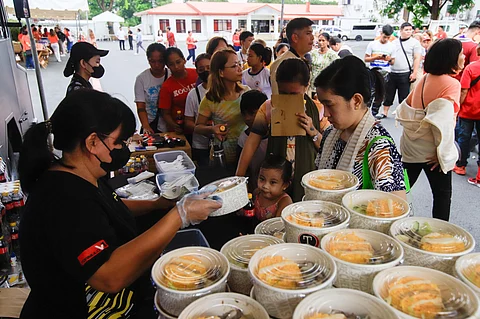
- NEWS
- the EDIT
- COMMENTARY
- BUSINESS
- LIFE
- SHOW
- ACTION
- GLOBAL GOALS
- SNAPS
- DYARYO TIRADA
- MORE

One of the most overlooked contributors to climate change is food loss and waste.
Food loss occurs during harvest, handling, and storage before food reaches the retail level, while food waste happens when edible food is discarded by retailers or consumers. When food is wasted, all the resources used to produce, transport and store it — such as water, energy and labor — are also lost.
Each year, around 24 percent of all food produced for human consumption — approximately 1.95 billion tons — is either lost or wasted.
Food loss and waste contribute up to 10 percent of total anthropogenic (human-caused) greenhouse gas (GHG) emissions, with an estimated 3.3 billion tons of carbon dioxide (CO2) equivalent released into the atmosphere annually.
In Metro Manila alone, an estimated 2,175 tons of food scraps are thrown away daily.
When food waste ends up in landfills, it decomposes and releases methane, a GHG 28 times more potent than CO2 in trapping heat.
If food loss and waste were a country, it would rank third in GHG emissions, behind only China and the United States.
Addressing food loss and waste is crucial in the fight against climate change. Reducing food waste can substantially lower global GHG emissions. It is time to shift away from our hyper-consumerist mindset and embrace sustainability in our daily lives.
The solution begins at home and within our communities. Simple actions such as planning meals and creating shopping lists help avoid overbuying and ensure that food is used before it spoils. Stick to meal plans and find creative ways to use leftovers to minimize waste.
Proper storage techniques, like using airtight containers and labeling them to track expiration dates, can also extend the shelf life of perishable items.
Communities can further contribute by establishing food banks or partnering with local organizations to redistribute excess food to those in need. This helps reduce waste while addressing hunger in vulnerable sectors.
Composting food scraps, instead of discarding them, can turn organic waste into nutrient-rich soil, reducing methane emissions from landfills and supporting community gardens.
Schools, local governments, and community groups can also take the lead by launching campaigns that educate the public on the impact of food waste on climate change. Hosting workshops, community food-sharing events, and promoting plant-based diets can inspire collective action.
The Climate Change Commission (CCC) remains committed to advocate for food security and sustainability as part of broader climate action efforts.
“Reducing food waste is one of the simplest yet most impactful ways that individuals and communities can contribute to lower greenhouse gas emissions. Let us all play our part by making mindful decisions about how we purchase, store, and dispose of food,” said CCC vice chairperson and executive director Robert E.A. Borje.
The 29th of September has been designated the International Day of Awareness of Food Loss and Waste through UN Resolution 74/209. This day highlights the global problem of food loss and waste and explores solutions, while promoting efforts to meet Sustainable Development Goal 12: Responsible Consumption and Production.
